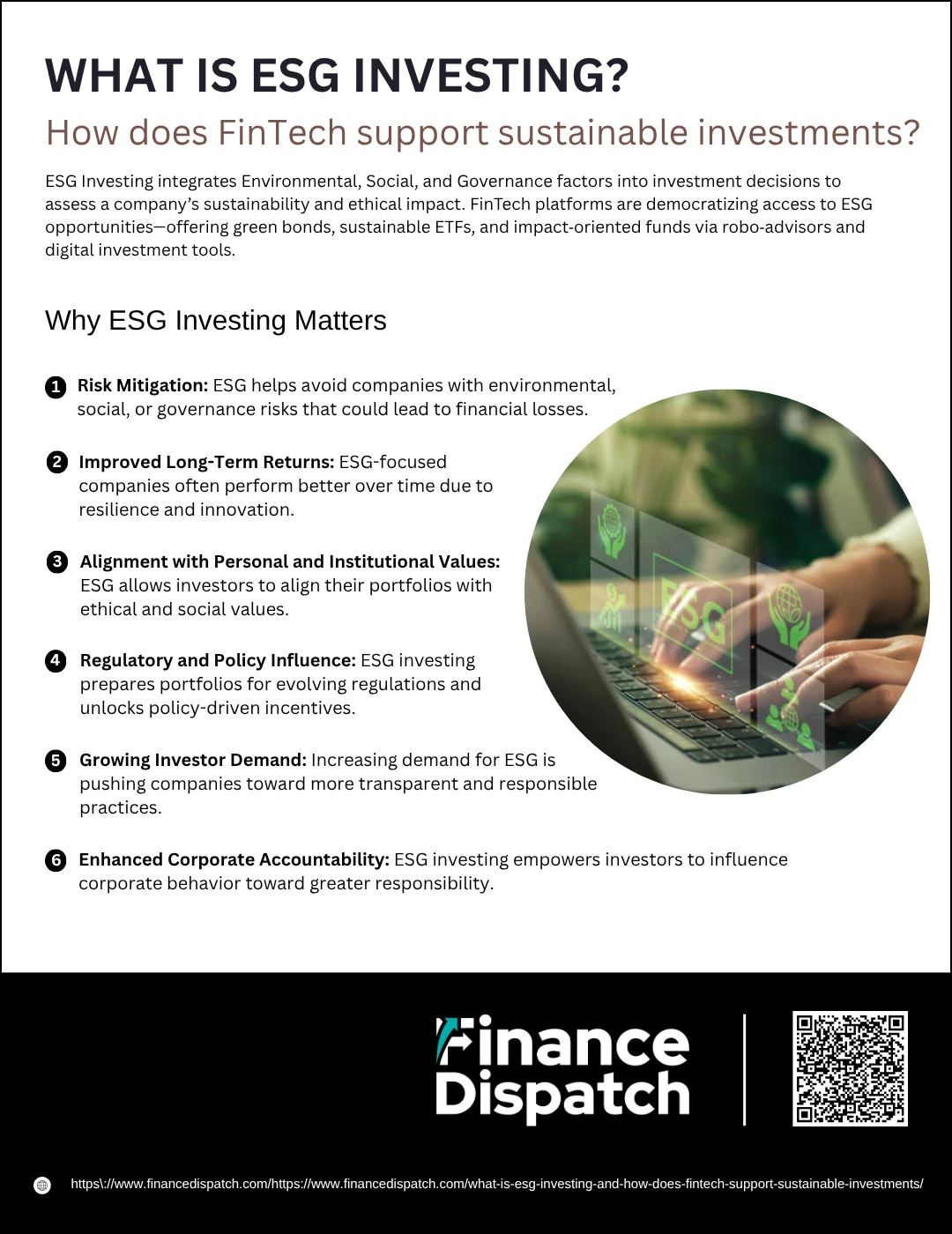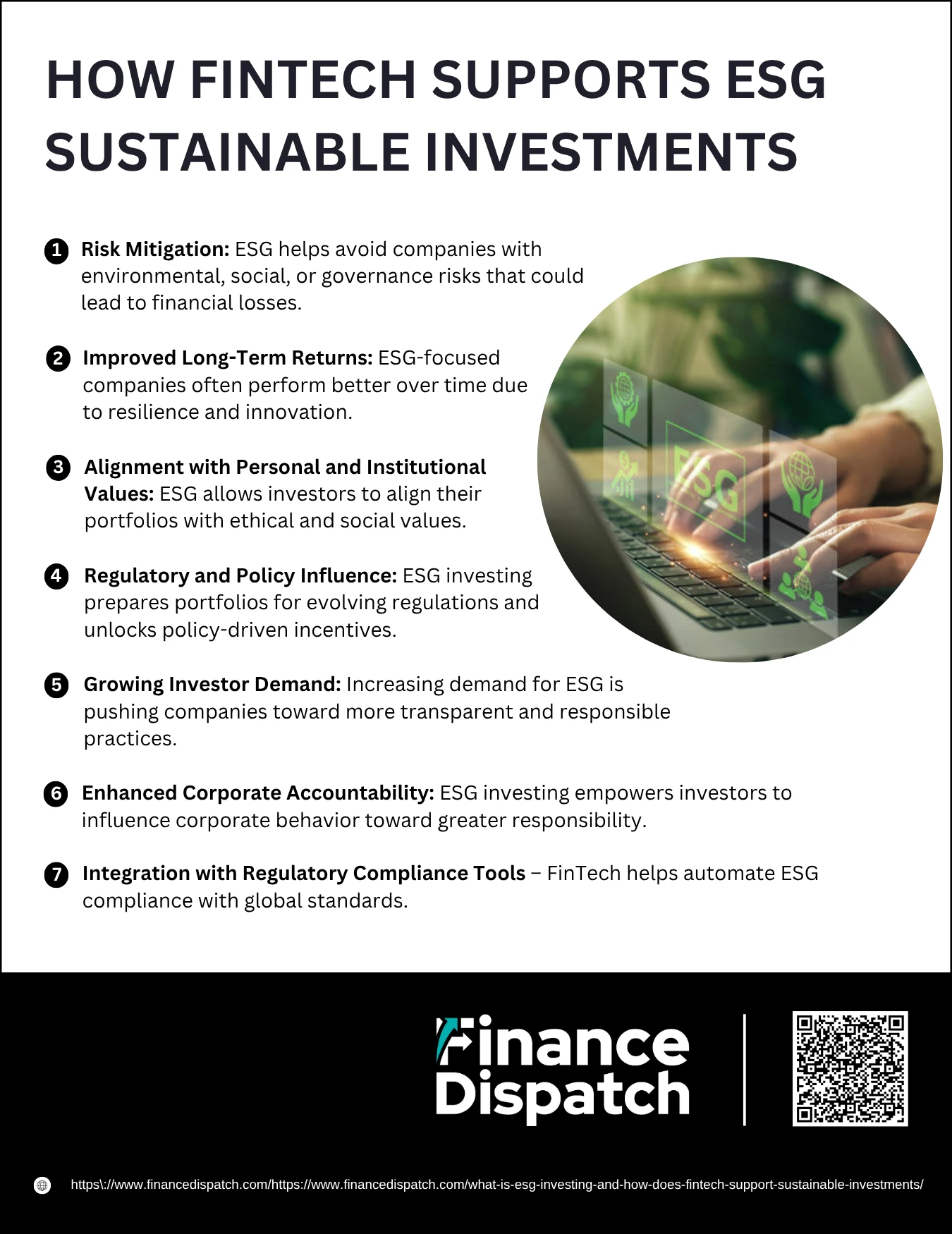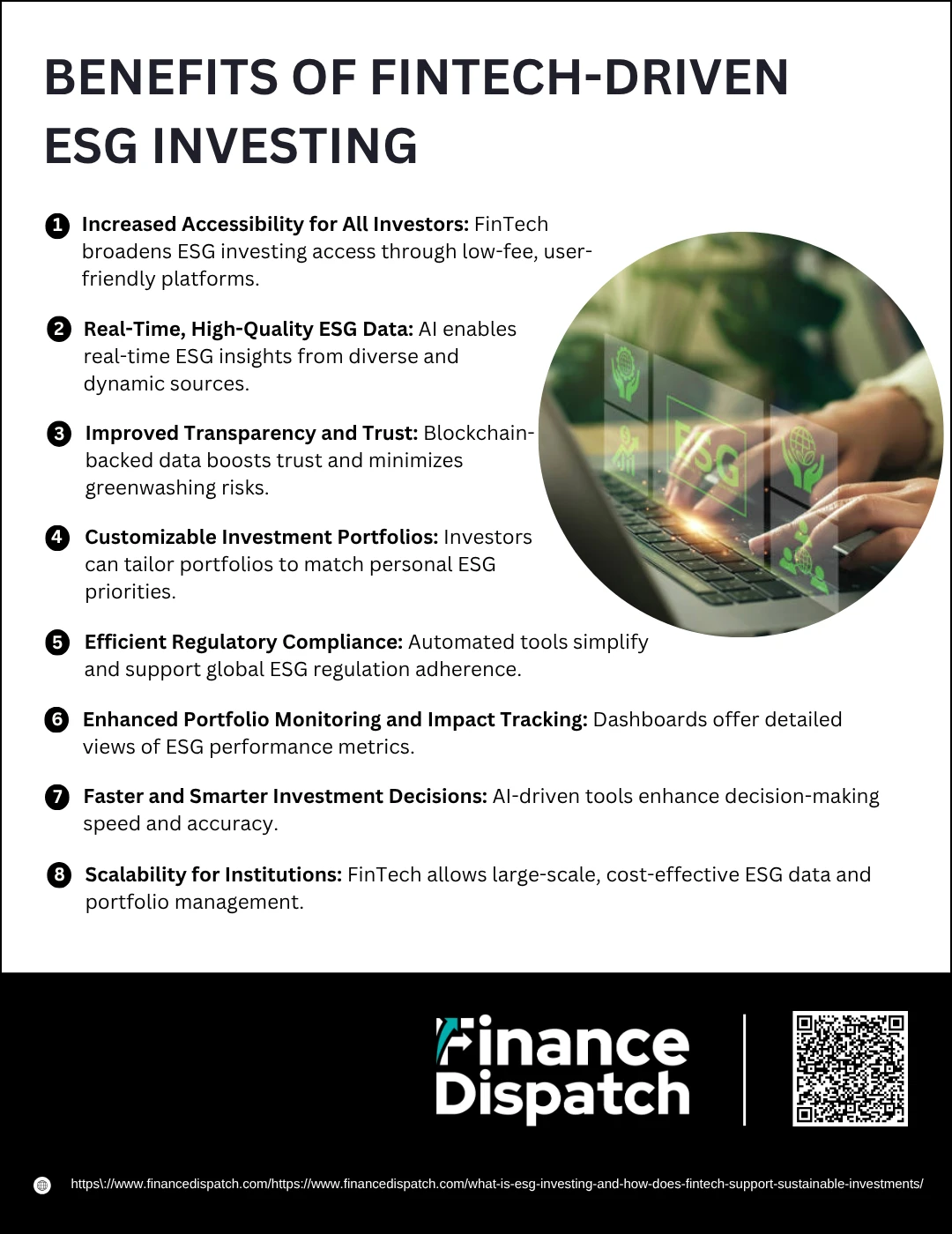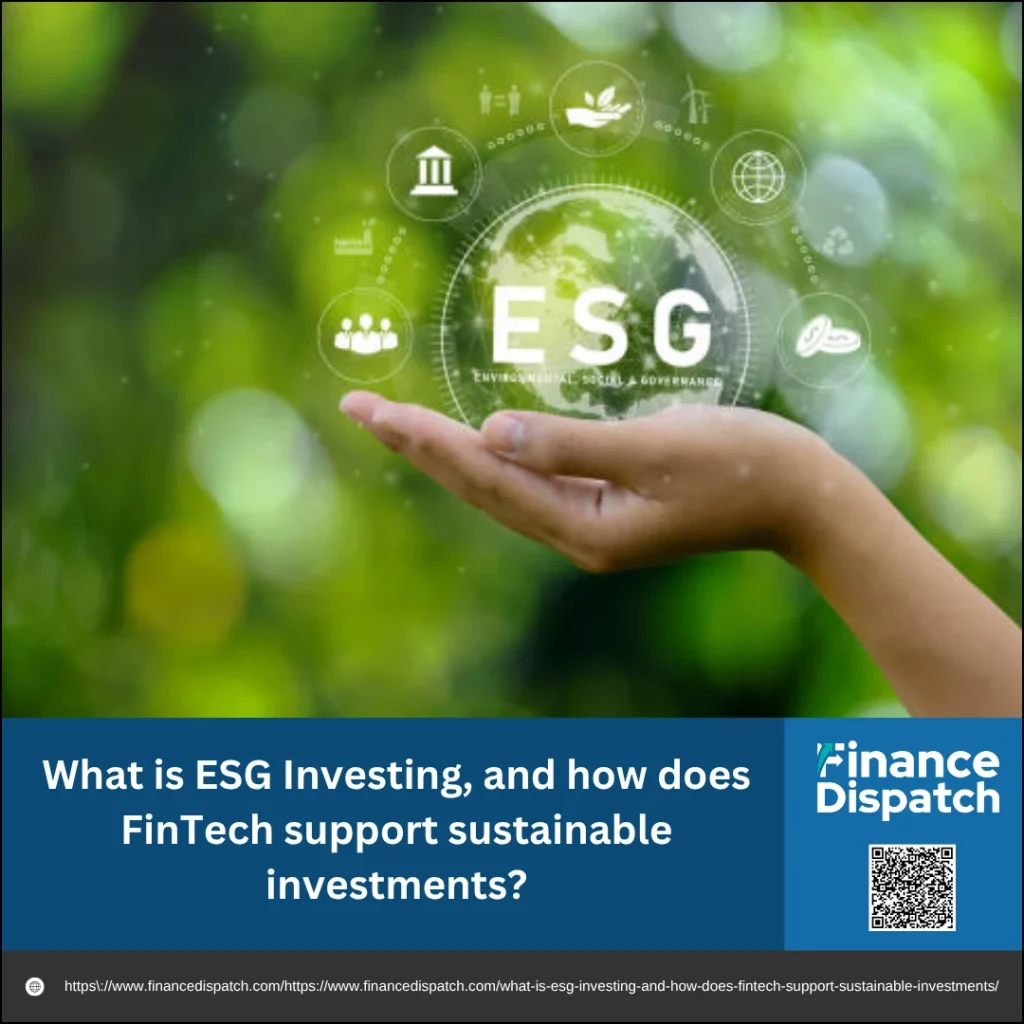In recent years, a growing number of investors have begun to look beyond traditional financial metrics and consider the broader impact of their investments. This shift has brought Environmental, Social, and Governance (ESG) investing into the spotlight—a strategy that integrates ethical, sustainable, and socially responsible considerations into financial decision-making. At the same time, the rise of financial technology (FinTech) is reshaping how these values are implemented in the investment world. By harnessing digital tools such as data analytics, artificial intelligence, and blockchain, FinTech empowers investors to evaluate ESG performance more accurately and access sustainable investment opportunities with greater transparency and efficiency. This article explores what ESG investing entails and how FinTech is driving its adoption across global financial markets.
What is ESG Investing?
ESG investing is an investment approach that factors in a company’s environmental, social, and governance practices alongside traditional financial analysis. Rather than focusing solely on profit margins or stock performance, ESG investors assess how a company manages its environmental impact, treats its employees and communities, and upholds ethical governance standards. For instance, a firm’s efforts to reduce carbon emissions, ensure workplace diversity, or maintain transparent leadership structures can all influence ESG ratings. By integrating these non-financial criteria, ESG investing aims to support companies that are not only financially sound but also responsible and sustainable in the way they operate. This approach appeals to investors who want their portfolios to reflect their values while still pursuing long-term financial returns.
 Why ESG Investing Matters
Why ESG Investing Matters
As global challenges like climate change, social inequality, and corporate misconduct gain public attention, investors are shifting their focus from purely financial returns to a broader understanding of value. ESG (Environmental, Social, and Governance) investing plays a vital role in this evolution. It recognizes that sustainable, ethical business practices are not just morally right—they also make sound financial sense. Investors who prioritize ESG criteria are not only aligning their portfolios with their personal or institutional values but also proactively managing long-term risks and opportunities. Here are several compelling reasons why ESG investing matters now more than ever:
1. Risk Mitigation
ESG investing helps identify companies that may face future liabilities due to environmental damage, social controversies, or weak corporate governance. By avoiding firms with high ESG risks, investors can reduce the likelihood of sudden financial losses caused by fines, lawsuits, or reputational harm.
2. Improved Long-Term Returns
Businesses that manage ESG issues effectively tend to be more resilient, innovative, and efficient. As a result, they often outperform competitors over the long run, offering investors more stable and sustainable returns.
3. Alignment with Personal and Institutional Values
ESG investing empowers individuals and institutions to make choices that reflect their values—whether it’s supporting clean energy, promoting fair labor practices, or encouraging diversity and inclusion. This alignment creates a sense of purpose and social impact beyond profits.
4. Regulatory and Policy Influence
Governments and regulators are increasingly enforcing ESG-related disclosure and compliance standards. Investing in ESG-conscious companies positions portfolios to better withstand regulatory shifts and benefit from policy-driven incentives, such as green tax credits or subsidies.
5. Growing Investor Demand
Demand for ESG investments is surging, especially among younger generations and large asset managers. This growing momentum is encouraging companies to adopt more transparent and responsible practices, further reinforcing the ESG ecosystem.
6. Enhanced Corporate Accountability
ESG investing applies pressure on corporations to act responsibly. Investors can influence company behavior through shareholder engagement and proxy voting, driving changes in environmental practices, labor policies, and governance structures that benefit society at large.
The Role of FinTech in ESG Investing
FinTech—short for financial technology—is revolutionizing how investors engage with ESG principles by making sustainable investing more accessible, transparent, and data-driven. Traditionally, ESG investing required access to specialized data and analysis, often limited to large institutions. Today, FinTech platforms are democratizing this space by offering user-friendly tools, real-time ESG data, and personalized investment options to a broader audience. Through innovations like robo-advisors, AI-powered analytics, blockchain transparency, and mobile investment apps, FinTech enables investors to evaluate ESG performance more accurately and align their portfolios with sustainability goals. As a result, FinTech acts as a powerful enabler, bridging the gap between ethical intentions and actionable investment strategies in the ESG landscape.
 How FinTech Supports ESG sustainable investments
How FinTech Supports ESG sustainable investments
FinTech is reshaping the landscape of sustainable investing by providing tools and technologies that make ESG (Environmental, Social, and Governance) investment strategies more accessible, efficient, and trustworthy. In the past, integrating ESG criteria into investment decisions was often limited to institutional investors due to the complexity of sourcing and analyzing non-financial data. Today, FinTech platforms are bridging that gap, enabling both retail and institutional investors to evaluate ESG performance with precision, monitor impact in real time, and align their investments with ethical and sustainability goals. From data analytics to automation, FinTech is not just a support system—it’s a catalyst for mainstreaming ESG investing. Below are the key ways it does so:
1. Advanced ESG Data Aggregation
FinTech platforms gather data from diverse sources such as corporate sustainability reports, satellite imagery, social media, and ESG rating agencies. They consolidate this information into intuitive dashboards, making it easier for investors to assess a company’s sustainability performance and compare it across sectors.
2. AI and Machine Learning for ESG Analysis
By leveraging AI and machine learning, FinTech tools can analyze massive datasets, identify ESG trends, detect greenwashing, and even predict future ESG risks. This enables investors to make forward-looking, data-driven decisions rather than relying solely on past disclosures.
3. Robo-Advisors with ESG Portfolios
Robo-advisors now offer customizable ESG-focused investment portfolios that align with an investor’s values. These platforms automate asset allocation and rebalancing based on ESG filters, making it easier for individuals to invest sustainably with minimal effort.
4. Blockchain for Transparency and Traceability
Blockchain technology offers a decentralized and tamper-proof way to verify ESG data, such as emissions tracking or ethical sourcing claims. It enhances trust in ESG disclosures by ensuring data integrity across the supply chain and investment lifecycle.
5. Mobile Investment Apps for Inclusive Access
FinTech has made ESG investing accessible to a wider audience through mobile apps that offer low-fee, easy-to-use platforms. Users can browse ESG scores, invest in green funds, and track their sustainability impact—all from their smartphones.
6. Real-Time Impact Tracking and Reporting
FinTech solutions often include real-time reporting tools that let investors monitor how their funds are performing in terms of environmental impact, social responsibility, or governance practices. These insights increase transparency and investor engagement.
7. Integration with Regulatory Compliance Tools
Many FinTech platforms support ESG compliance by incorporating regulatory frameworks like the EU Taxonomy, SFDR, or TCFD into their systems. This automation helps investors and asset managers stay aligned with global ESG reporting standards and avoid regulatory penalties.
 Benefits of FinTech-Driven ESG Investing
Benefits of FinTech-Driven ESG Investing
The fusion of financial technology (FinTech) and ESG (Environmental, Social, and Governance) investing has created a dynamic framework that promotes transparency, inclusivity, and smarter investment choices. In a market where investors are increasingly looking to align their portfolios with ethical and sustainable values, FinTech serves as a bridge—removing traditional barriers such as high costs, limited data, and complex compliance procedures. By integrating cutting-edge tools like AI, blockchain, and automation, FinTech allows both individual and institutional investors to access ESG insights with ease, build customized portfolios, and track their real-world impact. Here are the key benefits of FinTech-driven ESG investing in more detail:
1. Increased Accessibility for All Investors
FinTech platforms democratize ESG investing by making it available to a broader audience, including millennials, Gen Z, and low-capital investors. Through mobile apps, fractional shares, and low-fee models, these platforms enable anyone to support sustainable businesses without needing a financial advisor or large sums of money.
2. Real-Time, High-Quality ESG Data
Traditional ESG analysis relied heavily on periodic reports and static data. FinTech revolutionizes this by using AI and big data analytics to deliver real-time insights from a variety of sources, including satellite imagery, social media, and news feeds. This immediacy enhances decision-making accuracy and responsiveness to ESG developments.
3. Improved Transparency and Trust
Technologies like blockchain provide an immutable ledger for ESG data, ensuring that sustainability claims can be traced and verified. This level of transparency reduces the risk of greenwashing and strengthens investor confidence in ESG ratings and reports.
4. Customizable Investment Portfolios
With FinTech tools, investors can fine-tune their portfolios based on specific ESG criteria that align with their personal beliefs—such as excluding fossil fuels, supporting gender equality, or prioritizing low-carbon companies. These platforms also automate asset allocation and rebalancing, keeping portfolios aligned with the investor’s goals.
5. Efficient Regulatory Compliance
Navigating ESG regulations can be complex, especially with evolving standards across regions. FinTech simplifies this process by automating compliance checks, generating required reports, and aligning investment strategies with frameworks like the EU Taxonomy, TCFD, and SFDR.
6. Enhanced Portfolio Monitoring and Impact Tracking
Investors are no longer in the dark about the impact of their capital. FinTech provides interactive dashboards that track environmental footprints, social contributions, and governance scores. This real-time monitoring enables investors to hold companies accountable and adjust investments when necessary.
7. Faster and Smarter Investment Decisions
AI-powered FinTech tools can process ESG news, market trends, and company performance data to identify patterns, assess risks, and recommend timely actions. This improves the speed and intelligence of investment decisions without compromising on ethical priorities.
8. Scalability for Institutions
Large asset managers and institutional investors benefit from FinTech’s ability to manage ESG data and reporting across extensive portfolios. Automation helps streamline due diligence, risk assessments, and stakeholder reporting, making ESG integration scalable and cost-effective.
Challenges and Limitations of ESG Investing
While ESG investing has gained significant traction as a strategy for aligning financial goals with ethical and sustainable values, it is not without its complexities. As more investors seek to integrate environmental, social, and governance factors into their decision-making, a number of challenges have emerged that can limit the effectiveness, reliability, and consistency of ESG strategies. Understanding these limitations is crucial for investors who want to navigate the ESG landscape with clarity and caution. Below are some of the key challenges currently facing ESG investing:
1. Lack of Standardized ESG Metrics
ESG ratings vary widely between providers due to differing methodologies, making it difficult to compare companies consistently or rely on a single score for investment decisions.
2. Greenwashing Risks
Some companies exaggerate or misrepresent their ESG practices in order to attract ethical investors—a practice known as greenwashing—which undermines the integrity of ESG claims.
3. Data Gaps and Quality Issues
Many ESG data sources rely on self-reported information, which may be incomplete, outdated, or biased. This can affect the reliability of ESG assessments and lead to misinformed investment choices.
4. Short-Term Market Pressures
Despite ESG’s long-term benefits, market demands for short-term performance may discourage companies and fund managers from fully committing to sustainable strategies.
5. Complex Regulatory Landscape
The ESG regulatory environment varies across countries and is still evolving. Investors may struggle to stay compliant or align portfolios with multiple frameworks such as the EU Taxonomy or TCFD.
6. High Costs for ESG Integration
For some smaller firms or funds, the cost of gathering ESG data, hiring experts, and ensuring compliance can be high, potentially limiting their ability to participate meaningfully in ESG investing.
7. Limited Availability of ESG Investment Products
In certain regions or sectors, there may be a shortage of high-quality, ESG-compliant investment options, limiting diversification and investor choice.
8. Subjectivity and Bias in ESG Prioritization
What qualifies as “ethical” or “sustainable” can be subjective. Different investors prioritize different aspects of ESG, making it challenging to define universally accepted standards or benchmarks.
Future Outlook: The ESG-FinTech Synergy
The future of ESG investing lies in its deepening integration with FinTech innovation. As demand for ethical and sustainable investments grows, FinTech is expected to play an even greater role in shaping how ESG principles are implemented and scaled. Emerging technologies like AI-driven predictive modeling, decentralized finance (DeFi), and tokenized green assets will offer new ways to evaluate impact, democratize access, and streamline reporting. FinTech will also enhance global collaboration by standardizing ESG metrics and enabling cross-border transparency through blockchain-based systems. As regulatory frameworks mature and investors demand more accountability, the synergy between ESG and FinTech will likely become the backbone of a more inclusive, transparent, and purpose-driven financial ecosystem—transforming not just how we invest, but why we invest.
Conclusion
ESG investing represents a transformative shift in the way individuals and institutions approach financial decision-making—one that values long-term sustainability, ethical governance, and social responsibility alongside profitability. FinTech has emerged as a powerful enabler of this shift, making ESG investing more accessible, transparent, and data-driven than ever before. From real-time impact tracking to AI-powered analysis and personalized investment platforms, FinTech tools are breaking down traditional barriers and empowering investors to align their values with their financial goals. As both ESG and FinTech continue to evolve, their synergy holds the promise of a more responsible and resilient global financial system—where doing good and doing well can truly go hand in hand.



